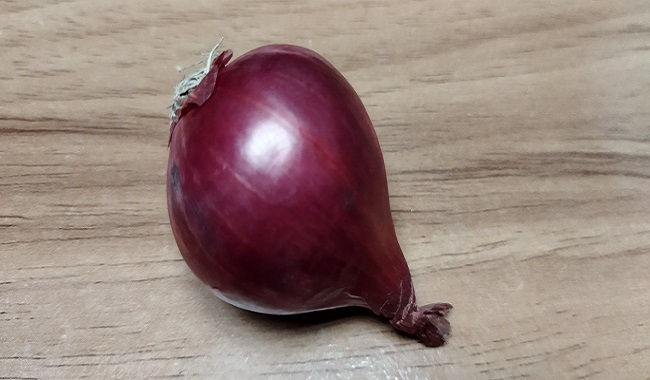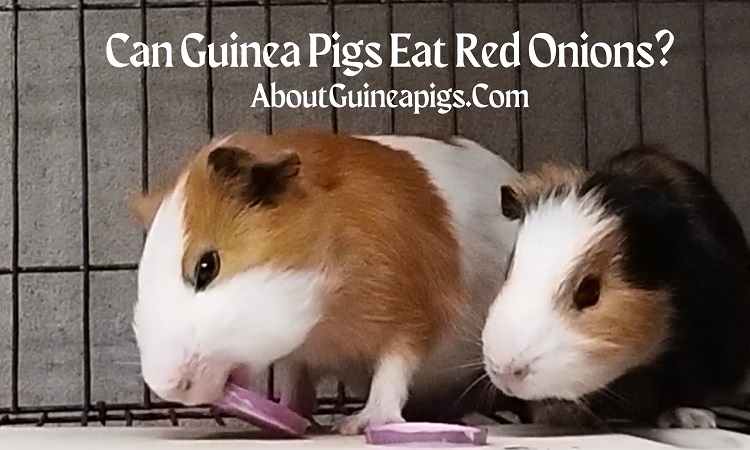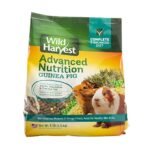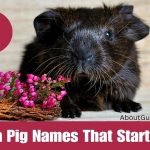Guinea pigs are beloved pets known for their gentle nature and adorable appearance. As responsible pet owners, we strive to provide our guinea pigs with a nutritious and balanced diet to promote their overall health and well-being. Every time I do some experiments with their diet.
Today I’m going to do another experiment with my guinea pigs. I want to know that can guinea pigs eat red onions? However, when it comes to introducing new foods into their diet, it is essential to consider the potential risks and ensure that the choices we make are safe for our furry companions.
In this context, one common question that arises is whether guinea pigs can eat red onions. Red onions, with their distinctive flavor and culinary versatility, are a popular ingredient in human meals, but do guinea pigs eat onion? or can they be included in a guinea pig’s diet?
This article aims to explore the topic of guinea pigs and onion, examining the potential risks and discussing the importance of making informed dietary choices for these adorable pets.
That means if you have guinea pigs then this article is very much important for you. Because I provided here the result of my real life experiments. I hope you will be get benefited from it.
Contents
- Can Guinea Pigs Eat Red Onions: The Experiment, Results, Risk, and Discussion
- Are Onions Poisonous to Guinea Pigs?
- Potential Health Risk of Red Onions For Guinea Pigs
- If Accidentally Guinea Pigs Ate Onions Then What To Do?
- Frequently Asked Questions
- Q: What are the risks of feeding guinea pigs onions?
- Q: How much onion can kill a guinea pig?
- Q: Are there any specific guinea pig breeds or ages that should avoid red onions?
- Q: What are the signs of an adverse reaction if a guinea pig eats red onions?
- Q: Are there any alternative vegetables that are safer for guinea pigs to consume instead of red onions?
- Final Opinion
Can Guinea Pigs Eat Red Onions: The Experiment, Results, Risk, and Discussion
Guinea pigs are adorable pets that require a carefully balanced and nutritious diet to ensure their overall health and well-being. As a responsible guinea pig owner, it is essential to explore and understand what foods are safe for these small creatures.
In this experiment, the focus is on red onions, specifically investigating whether guinea pigs can consume red onions and evaluating the associated risks.
Experiment:
To determine the guinea pig’s response to red onions, two guinea pigs named Max and Maya were selected. The experiment involved offering approximately 4 grams of red onions to each guinea pig.
Red onions were chosen due to their distinct flavor and potential health implications. The guinea pig’s reactions, including their initial observation and eating behavior, were closely monitored and recorded.
Results:
The results of the experiment indicated that neither Max nor Maya showed any interest in consuming red onions. Upon being presented with the red onions, the guinea pigs immediately exhibited a strong sense of smell, followed by observing the food item.
However, they quickly distanced themselves from the red onions without displaying any inclination to eat them. In total, both guinea pigs consumed 0% of the onion skin, indicating a clear aversion to red onions.
Here is the video that will help you to get understand their behavior during serving time.
Red Onion Consumed Report:
|
Descriptions |
Amounts To Eat (Max & Maya) |
|
Was Given To Eat |
4 Grams |
|
They Ate |
0 Grams |
|
Percent Ate (%) |
0% |
|
Remains |
4 Gram |
Risks:
While the experiment demonstrated the guinea pigs’ reluctance to consume red onions, it is important to highlight the potential risks associated with offering this particular food to guinea pigs.
Onions, including their skin, contain compounds that can be harmful to guinea pigs, leading to digestive issues and potentially causing anemia. These compounds, such as organ sulfides and thiosulphate, can interfere with the proper functioning of a guinea pig’s red blood cells, resulting in a condition known as Heinz’s body anemia.
Discussion:
Based on the experiment’s findings, it is evident that guinea pigs, represented by Max and Maya, do not have an appetite for red onions. This behavior suggests a natural instinct to avoid potentially harmful food sources.
Red onions contain substances that can pose significant health risks to guinea pigs, making them unsuitable for inclusion in their regular diet. The guinea pigs’ refusal to consume red onions aligns with their instinctive ability to detect and reject foods that may be detrimental to their well-being.
As responsible pet owners, it is crucial to be aware of the potential dangers that certain foods pose to our furry companions. Although red onions may be a common ingredient in human diets, they should be strictly avoided when it comes to feeding guinea pigs.
Instead, it is recommended to provide guinea pigs with a balanced diet consisting of high-quality hay, fresh vegetables, and specially formulated guinea pig pellets.
Are Onions Poisonous to Guinea Pigs?
Onions are indeed considered poisonous to guinea pigs. While they may be a common ingredient in many human dishes, onions contain compounds that can be harmful to guinea pigs when ingested. The primary toxic components found in onions are organ sulfides and thiosulphate.
Guinea pigs lack certain enzymes necessary to effectively process and metabolize these compounds. As a result, consuming onions, including their skin, can lead to a range of health issues for guinea pigs, including digestive problems and anemia.
One of the most significant risks associated with feeding onions to guinea pigs is the potential for Heinz body anemia. The compounds found in onions can damage the red blood cells of guinea pigs, leading to the formation of Heinz bodies.
This condition disrupts the normal functioning of the red blood cells, ultimately causing anemia. Anemia can result in weakness, lethargy, loss of appetite, and potentially life-threatening complications if not addressed promptly.
Furthermore, onions’ pungent odor can also be irritating to a guinea pig’s sensitive respiratory system. Guinea pigs are prone to respiratory issues, and exposure to strong odors, such as those emitted by onions, can exacerbate respiratory problems or lead to respiratory infections.
Given these potential risks, it is crucial to avoid feeding onions, including all varieties such as red onions, to guinea pigs. Instead, focus on providing a balanced diet consisting of fresh vegetables, high-quality hay, and specially formulated guinea pig pellets.
Vegetables such as leafy greens, bell peppers, carrots, and cucumbers are generally safe and suitable for guinea pigs. As responsible guinea pig owners, it is vital to prioritize the health and well-being of these small pets by understanding which foods can be harmful to them.
By avoiding onions and other potentially toxic foods, we can ensure that our guinea pigs live a happy and healthy life. If there are any concerns or if a guinea pig accidentally consumes onions, it is recommended to consult a veterinarian for appropriate guidance and care.
Potential Health Risk of Red Onions For Guinea Pigs
Red onions despite their widespread use in human cuisine, pose potential health risks to guinea pigs. The following are the key reasons why red onions should be avoided as part of a guinea pig’s diet:

Harmful Compounds:
Red onions, like other varieties of onions, contain compounds that can be detrimental to guinea pigs. These compounds include organ sulfides and thiosulphate. While these substances may not be harmful to humans, guinea pigs lack the necessary enzymes to safely process them.
Digestive Issues:
The consumption of red onions by guinea pigs can lead to digestive problems. The presence of the aforementioned compounds can disrupt the delicate balance of the guinea pig’s digestive system, potentially causing discomfort, bloating, gas, or diarrhea.
Anemia:
One of the most significant risks associated with feeding red onions to guinea pigs is the potential for anemia. Onions, including their skin, contain substances that can damage a guinea pig’s red blood cells, leading to a condition known as Heinz body anemia. This condition can be serious and even life-threatening for guinea pigs if not addressed promptly.
Respiratory Issues:
Another concern with red onions is their pungent odor, which can irritate a guinea pig’s sensitive respiratory system. Guinea pigs have delicate respiratory systems, and exposure to strong odors, such as those emitted by onions, can lead to respiratory distress or respiratory infections.
If Accidentally Guinea Pigs Ate Onions Then What To Do?
If your guinea pig accidentally consumes onions, it is important to take immediate action to minimize any potential harm. Here are the steps you should follow if you suspect your guinea pig has ingested onions:
Assess the Situation:
Determine the quantity of onions your guinea pig may have consumed and any accompanying symptoms or changes in behavior. This information will be helpful when seeking guidance from a veterinarian.
Contact a Veterinarian:
Reach out to a veterinarian experienced in treating small animals like guinea pigs. Explain the situation and provide details about the onion ingestion. The veterinarian will be able to provide specific advice based on your guinea pig’s health status and the amount of onion consumed.
Observe Your Guinea Pig:
Keep a close eye on your guinea pig for any signs of distress or adverse reactions. Symptoms may include vomiting, diarrhea, loss of appetite, weakness, or changes in behavior. Promptly report any unusual symptoms to the veterinarian.
Provide Fresh Water:
Ensure that your guinea pig has access to clean, fresh water at all times. Hydration is crucial and can help flush out any potential toxins.
Follow Veterinary Advice:
Follow the veterinarian’s instructions carefully. They may recommend bringing your guinea pig in for an examination or providing supportive care at home. It is important not to attempt any treatments or remedies without professional guidance.
Adjust the Diet:
After consulting with the veterinarian, adjust your guinea pig’s diet accordingly. Focus on providing a balanced diet consisting of guinea pig-specific vegetables, fresh hay, and pellets. Avoid offering any foods that are known to be toxic or harmful, such as onions or other allium plants.
Remember, it is always better to be cautious and proactive when it comes to your guinea pig’s health. If there is any doubt or concern, seek professional veterinary assistance immediately. They will be able to provide the best advice and care for your guinea pig’s specific situation.
Frequently Asked Questions
Q: What are the risks of feeding guinea pigs onions?
A: Feeding guinea pigs onions can pose several risks. Onions contain compounds such as organ sulfides and thiosulphate, which can be harmful to guinea pigs.
These substances can cause digestive issues, and respiratory problems, and potentially lead to anemia. It is best to avoid feeding onions to guinea pigs to ensure their well-being.
Q: How much onion can kill a guinea pig?
A: Onions contain compounds that are toxic to guinea pigs, and it is best to avoid feeding them onions altogether. The exact amount of onion that can be fatal to a guinea pig can vary depending on the individual animal’s size, overall health, and tolerance.
However, even a small amount of onion can potentially cause harm to a guinea pig. It is crucial to prioritize their safety by keeping onions away from their diet entirely. If you suspect your guinea pig has consumed onions, it is advisable to seek immediate veterinary assistance.
Q: Are there any specific guinea pig breeds or ages that should avoid red onions?
A: All guinea pig breeds and ages should avoid red onions. The potential risks and toxic effects of red onions apply to guinea pigs of all breeds and ages. The compounds present in onions can cause digestive issues, anemia, and respiratory problems in guinea pigs, regardless of their breed or age.
It is essential to prioritize their well-being by excluding red onions from their diet entirely. Instead, focus on providing a balanced and appropriate guinea pig diet consisting of hay, fresh vegetables, and specially formulated pellets.
Q: What are the signs of an adverse reaction if a guinea pig eats red onions?
A: If a guinea pig eats red onions, it may exhibit signs of an adverse reaction. These can include vomiting, diarrhea, loss of appetite, weakness, lethargy, respiratory distress, or changes in behavior. These symptoms may vary in severity depending on the amount of onion consumed and the guinea pig’s individual tolerance.
If you notice any concerning signs or suspect onion ingestion, it is important to consult a veterinarian for proper evaluation and guidance. Prompt veterinary attention is crucial to ensure the well-being of your guinea pig.
Q: Are there any alternative vegetables that are safer for guinea pigs to consume instead of red onions?
A: Yes, there are several alternative vegetables that are safer and suitable for guinea pigs to consume. Leafy greens such as romaine lettuce, kale, and spinach are excellent choices. Other safe options include bell peppers, carrots, cucumbers, zucchini, and celery.
These vegetables provide essential nutrients and fiber while avoiding the potential risks associated with red onions. Remember to introduce new foods gradually and monitor your guinea pig’s response to ensure they tolerate them well. Always provide fresh, washed vegetables as part of a balanced guinea pig diet.
Final Opinion
Through this experiment, it has been established that guinea pigs, such as Max and Maya, do not eat red onions willingly. Red onions contain compounds that can be harmful to guinea pigs, leading to potential digestive issues and anemia.
Therefore, it is imperative to prioritize the health and well-being of guinea pigs by avoiding the inclusion of red onions in their diet. By adhering to a proper and balanced guinea pig diet, owners can ensure their beloved pets live happy and healthy lives.
Useful Link – Can Guinea Pigs Eat Onions? What You Need to Know!










